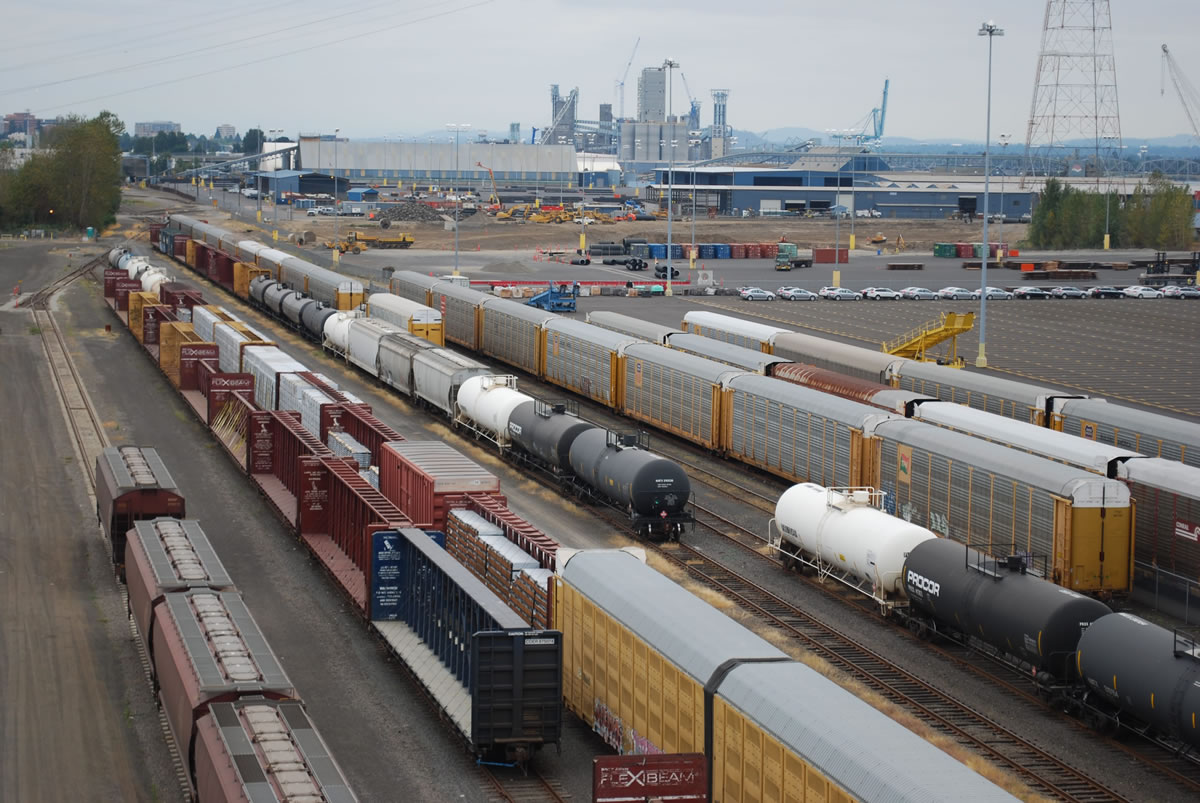The Port of Vancouver expects to head into 2014 with a beefed-up spending plan to pay for continued construction of its rail network, the purchase of a key property for future expansion, and other infrastructure improvements. The port says it won’t impose the 1 percent property tax hike it’s allowed annually under state law.
Port managers are asking the port’s three elected commissioners to approve a total budget of $86.4 million for 2014, up roughly 46 percent from this year’s total projected budget of about $59 million.
Most of the increase would be allocated for capital projects. The port would spend about $54 million on rail, land and other projects in 2014. That’s up 69 percent from the $32 million it expects to spend on such projects by the end of this year.
Next year’s capital project expenses include $17 million to keep moving on an improvement intended to eliminate a train-traffic chokepoint by building a new rail entrance to the port. Capital project expenses also include $15.8 million to acquire 88 acres for eventual westward industrial expansion.
The $17 million rail improvement is part of the port’s larger and ongoing $275 million West Vancouver Freight Access project. The freight rail expansion project is intended to bolster the regional economy by speeding the movement of cargo, attracting new industrial tenants and creating thousands of jobs over many years. Already, the port has spent about $150 million on the project, which has been on the drawing board since 2004. The project is more than half finished, and the port anticipates wrapping it up in 2017.
Theresa Wagner, the port’s communications manager, said the port’s push on capital projects in the 2014 budget reflects a long-term strategy of increasing such spending as the port’s revenue growth and financing options allow.
“It’s what we’ve been planning,” she said.
The port’s recent approval of a lease with Tesoro Corp. and Savage Companies to build a controversial oil-transfer terminal has garnered plenty of public attention. The lease is worth at least $45 million to the port over an initial 10 years. However, the lease is not a done deal because it’s undergoing a state-level environmental regulatory examination that will take at least a year to complete. So the port’s 2014 budget involves no major revenue and no spending related to the proposed oil-terminal project. Still, the port will receive $360,000 from Tesoro and Savage, paid as fees to maintain exclusive rights to the property the companies want to lease, in 2014.
‘Significant growth’
The proposed budget is more optimistic than last year’s. The 2013 spending plan reflected a slimmed-down approach that put off some pieces of the West Vancouver Freight Access project. That more cautious plan stemmed from weakness in the global economy and uncertainty surrounding how much the port would earn from imports of wind-energy components.
Heading into next year, Wagner said, the port expects imports of wind-energy cargo to pick up and exports of wheat, which dipped this year, to rebound.
“We’re pretty optimistic,” she said.
The port anticipates total revenues in 2014 of about $53.43 million, up 9 percent from this year’s expected $49 million. The port’s revenue comes from operating sources, such as shipping fees and industrial tenant rents, and from nonoperating sources, including property taxes and grants.
Using a general fund transfer and financing, the port would add about $32.9 million to its funding sources for a total budget of $86.4 million. It would spend about $54 million — roughly 62 percent — on capital projects.
The port’s board of commissioners is slated to adopt a final budget during its Nov. 12 public hearing. Commission President Jerry Oliver said the 2014 budget reflects the port’s forward-looking thinking in constructing infrastructure and acquiring property to attract new employers. The port’s shovel-ready Centennial Industrial Park, intended to attract up to 500 jobs, is regularly attracting inquiries, Oliver said, and the port’s prospects include the oil terminal and a potash export facility planned by Australian mining giant BHP Billiton. “We’re on track to have significant growth,” he said.
The port anticipates it will receive $9.98 million in property tax revenue in 2014. That’s about the same amount it anticipates bringing in by the end of this year. Commissioners are expected to approve the 2014 budget without increasing the levy by 1 percent.
Wagner said the port’s tax levy amount “has remained relatively flat” since 2009, when it received $9.69 million in property-tax revenue.




